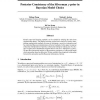Free Online Productivity Tools
i2Speak
i2Symbol
i2OCR
iTex2Img
iWeb2Print
iWeb2Shot
i2Type
iPdf2Split
iPdf2Merge
i2Bopomofo
i2Arabic
i2Style
i2Image
i2PDF
iLatex2Rtf
Sci2ools
112
click to vote
NIPS
2008
2008
Posterior Consistency of the Silverman g-prior in Bayesian Model Choice
Kernel supervised learning methods can be unified by utilizing the tools from regularization theory. The duality between regularization and prior leads to interpreting regularization methods in terms of maximum a posteriori estimation and has motivated Bayesian interpretations of kernel methods. In this paper we pursue a Bayesian interpretation of sparsity in the kernel setting by making use of a mixture of a point-mass distribution and prior that we refer to as "Silverman's g-prior." We provide a theoretical analysis of the posterior consistency of a Bayesian model choice procedure based on this prior. We also establish the asymptotic relationship between this procedure and the Bayesian information criterion.
Bayesian Interpretation | Information Technology | NIPS 2008 | Regularization Methods | Regularization Theory |
| Added | 30 Oct 2010 |
| Updated | 30 Oct 2010 |
| Type | Conference |
| Year | 2008 |
| Where | NIPS |
| Authors | Zhihua Zhang, Michael I. Jordan, Dit-Yan Yeung |
Comments (0)

